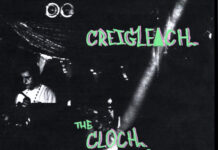
TESCO have introduced rigorous safety measures to ensure their bananas do not pose a safety risk to customers after concerns were raised that killer spiders could have infected a consignment of bananas at one of their Limerick stores.
A customer at the Tesco store in the Crescent Shopping Centre reported that bananas he bought there contained what looked like an infestation of eggs from the lethal Brazilian Wandering Spider. The bananas were shipped to Ireland from Costa Rica which is home to the toxic insect that can give a man a painful four-hour erection before imminent death.
However in a statement issued to the Limerick Post on Thursday morning, TESCO confirmed that lab results show that the skin of the banana contained a harmless spider.
“We have apologised to the customer for the inconvenience. We can reassure all our customers that we have a rigorous testing system in place for all fruit. We have recently introduced additional treatments at source and we now wash all bananas twice using a higher pressure hose before reaching the shelf,” the statement explained.
A 31-year-old Limerick man paid €1.55 for bananas at the supermarket in Dooradoyle last week. After returning home, father-of-two Andre was shocked to find that one of the bananas contained what looked like an infestation of lethal Brazilian wandering spider eggs. The hospitality sector worker from Dooradoyle came to this conclusion after reading reports of similar findings at a Tesco store in the UK only two weeks earlier.
One of the most venomous spiders on the planet, the arachnids can be found throughout Latin America including Brazil and Costa Rica.
The alarm was raised for Andre after his wife Gerda read reports about a woman in the UK who had purchased bananas at Tesco last month, which allegedly contained an infestation of the killer spiders’ eggs. The fruit bought by the English shopper had also come from Costa Rica and contained similar webbing and a spider’s egg cocoon as that found on a banana in Limerick.
“My wife noticed the eggs and webbing on the banana when I brought it home from the supermarket last Sunday. She had read about a similar case in England and felt straight away that it might be the same thing, that it might be the eggs of Brazilian wandering spiders,” Andre explained.
His wife immediately posted on the Limerick Post facebook page warning shoppers to be on the lookout.
“I think we got eggs of the most dangerous spiders in the world called Brazilian wandering spiders. I believe there was a spider cocoon and webbing on one of the bananas which had a Costa Rica sticker on them,” Gerda warned.
The eggs and webbing were only found on one banana in the loose bunch purchased at Tesco in Dooradoyle. The skin wasn’t broken on the fruit so the family weren’t concerned that their home might have been taken over by venomous baby spiders.
“We didn’t want to throw the bananas out after buying them. We didn’t know what to do with the banana to be honest, so I put it in a pyrex dish and stuck it in the oven for an hour and a half at 250 degrees,” said the Limerick father of two young daughters.
“We decided to contact the local paper and warn people that we had found this in Tesco. We thought this would be better than contacting the supermarket directly. We didn’t see what they were going to be able to do about it. We don’t want any publicity for ourselves, we just want people to be aware and be safe,” Andre told the Limerick Post.

Prior to the receipt of lab results, a spokesperson for Tesco Ireland commented, “We were very sorry to hear that our customer was distressed and as soon as we heard about the issue, we made contact with the customer immediately. We are arranging for the product to be collected so that we can carry out an investigation with our supplier.”
Tesco Ireland customer service also pointed out that it works closely with their pest control specialists and in rare instances like this, can ask them to attend the customers house to better understand the situation, inspect the property for any signs of evidence and if required will complete any control or monitoring.
The Limerick Post this week sent photographs of the suspect fruit to technical field consultant Richard Faulkner at Rentokil in Raheen Business Park.
“Unfortunately, we cannot make any sort of ID from the photograph provided as the spider is not visible and even leading tropical spider specialists would find it difficult to make a positive ID from spider eggs,” said Mr Faulkner.
“The likelihood of anyone bringing home tropical arthropods (spiders or insects) in produce that they have purchased in shops or supermarkets is extremely small. Think of how often an average person buys fresh fruit and vegetables and how often these cases occur?”
In order to avoid brining pests of any kind into the home, Rentokil recommended that people have a good inspection of any produce that they are going to buy.
“Also buy loose produce rather than pre-packed as this is easier to inspect,” Mr Faulkner advised.











